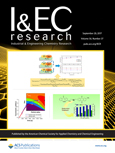
Affiliations:
Shell Global Solutions, Shell Technology Centre Amsterdam, Grasweg 3, 1031 HW Amsterdam, The Netherlands,
Centre for Energy Resources Engineering (CERE), Department of Chemical and Biochemical Engineering, Technical UniVersity of Denmark, DK-2800, Lyngby, Denmark, Bayer Technology Services GmbH, Process Technology, Kinetics, Properties & Modeling, Building B310, D-51368 LeVerkusen, Germany,
IFP, 1& 4 AVenue de Bois-Pre´au, 92852 Rueil-Malmaison Cedex, France,
The Petroleum Institute, Department of Chemical Engineering, P.O. Box 2533, Abu Dhabi, United Arab Emirates,
National Institute of Chemistry, Department of Catalysis and Reaction Engineering, P.O. Box 660, SI-1001 Ljubljana, Slovenia
Department of Earth Science and Engineering, Imperial College London, London SW7 2AZ, United Kingdom
Reference: Ind. Eng. Chem. Res., 2010, 49 (22), pp 11131–11141
Abstract: “This work reports the results of an investigation on industrial requirements for thermodynamic and transport properties carried out by the Working Party on Thermodynamic and Transport properties (http://www.wp-ttp.dk/) of the European Federation of Chemical Engineering, EFCE (http://www.efce.info/). A carefully designed questionnaire was sent to a number of key technical people in companies in the oil and gas, chemicals, and pharmaceutical/biotechnology sectors. Twenty-eight companies have provided answers which formed the basis for the analysis presented here…”
DOI: 10.1021/ie101231b
Comments: the authors analyze the answers provided in the survey on standardization as follows “Models should be present in simulators for active use by industry sotherwise, they may be forgotten. CAPE-OPEN is a useful tool (and standard) for integrating user developed unit operations and thermodynamics packages in commercial process simulation programs, but it is still not fully developed and supported. One of the comments in the survey was that the analytical derivatives are needed. The tool should be improved further, allowing exchange of thermodynamic packages belonging to different process simulators.” Some misunderstanding seems to have been introduced. First CAPE-OPEN is not a tool: it is only a standard which needs to be implemented by software developers and vendors. Next analytical derivatives have been defined from the start in the CAPE-OPEN standard. However software developers may have refrained now and then from implementing derivative properties in their thermodynamic servers or from calling such derivatives from Material Objects in PMEs. The need for improvement is felt also by CO-LaN. However improvement has many facettes and the directions for improvement have to be specifically defined.
